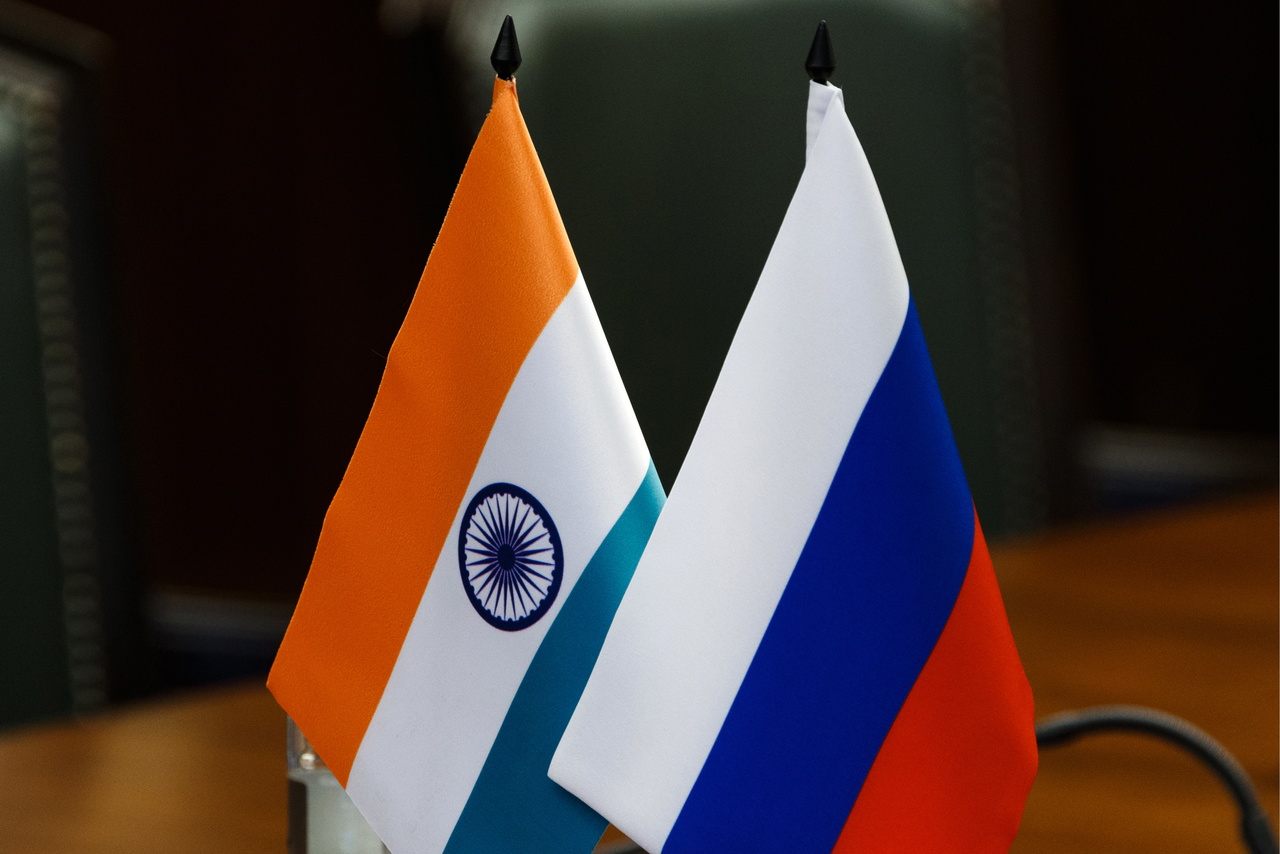The Waning India-Russia Partnership is an Unexpected Effect of the War in Ukraine
India has not condemned Russia for its aggression against Ukraine, which stems from historical ideological ties, as well as their strategic and military cooperation. However, the war has led to unfavourable changes from India’s point of view—the weakening of Russia, the collapse of its cooperation with the West, and a growing dependence on China. As a result, Russia is diminishing in importance as a key partner of India, including a supplier of weapons and technology. In the long run, closer cooperation between India and the U.S. and EU countries in the field of security and energy will help to move India away from Russia.
 Vadim Savitsky/TASS/Forum
Vadim Savitsky/TASS/Forum
India's abstention in the UN General Assembly (UNGA) vote on 12 October condemning Russia for annexing Ukraine’s four regions was another example of its neutral position on the Russian aggression. Since the beginning of Russia’s full-scale invasion of Ukraine, India has been trying not to alienate either its Western partners or Russia. As a result, it has consistently abstained from votes in international forums (UN Security Council, UNGA, UNHCR,) calling for an end to the hostilities and for resolving the dispute through diplomacy and dialogue. At the same time, it has not joined the diplomatic isolation and international sanctions against Russia. On the contrary, since March this year it has increased purchases of Russian oil many times, becoming the second-largest importer of it in the world after China.
Strategic Partnership
The basis of Indian-Russian relations is composed of strong historical ties, a similar vision of the world order, and converging strategic interests. Traditionally, India counted on support of the USSR in international forums and its veto in the UNSC on key issues (e.g., Kashmir), which in turn has made Russia its most trusted partner to this day. Hence, after the annexation of Crimea in 2014, Prime Minister Narendra Modi assured Vladimir Putin (with whom he has a 20-year personal relationship) that “every child in India knows that Russia is India’s greatest friend”, and during the last meeting of the leaders in Samarkand in September this year, he emphasised the “unbreakable friendship” of the two countries. Since 2000, they have been linked by a strategic partnership (annual summits of leaders have been held since then), which in 2010 were raised to the rank of “special and privileged”.
Their former ideological ties, including criticism of Western imperialism and colonialism, transformed after the end of the Cold War into opposition to the unipolar world where the U.S. and its allies have a privileged position. Both countries share similar views on many international issues (e.g., policies to promote democracy, humanitarian interventions) and have engaged in bilateral and multilateral cooperation (e.g., within BRICS) to build a multipolar order where emerging powers will gain more influence on global governance.
Russia is also strategically important for India as a counterbalancing power in Asia to China’s growing influence. As Indo-Chinese relations deteriorate, the best scenario from India's perspective would be a strong Russia that has good relations with the West and maintains distance in relations with China. India also fears that if its relations with Russia worsen, Russia could increase cooperation with Pakistan, including through the supply of weapons.
Defence Cooperation. Russia is India’s largest source of arms and armaments, and both armies conduct regular military exercises together. In December 2021, a special “2+2” dialogue format of defence and foreign ministers was launched and a new agreement on military cooperation for 2021-2031 was signed. According to estimates, 60-90% of the weapons used by the Indian armed forces are of Russian or Soviet origin, including tanks, submarines, and aircraft.
Russia's attractiveness as a defence partner is due to three reasons: Russian weapons are cheaper than Western ones and easier to use, and the Indian crews are very familiar with it; second, Russia was ready, unlike Western countries, to sell India the most modern weapons, such as the S-400 anti-missile defence system or nuclear-powered submarines; third, Russia agreed to relocate some of the equipment production to India, technology transfer, and technological cooperation—for example, T-90 tanks or SU-30MKI planes are produced in India under Russian licenses and both states developed jointly the BrahMos supersonic cruise missile. At the same time, since the improvement in Indian-American relations after 2001, India’s dependence on Russian suppliers has been steadily declining. India began to diversify its arms purchases, cooperating with the U.S., France, Israel, and others. While at the beginning of the 21st century as much as 80% of India’s imported weapons came from Russia, by the years 2012-2016, it had dropped to 69%, and in the period 2017-2021 was only 46%.
Economic and Social Relations
Strong military ties are not accompanied by important economic interests or interpersonal contacts. In recent years, Russia's share in India's foreign trade has fluctuated below 1.5%, ranking it 25th among the top trading partners. In 2021, the total trade in goods with Russia amounted to $13 billion, much less than with the U.S. ($119 billion), the EU ($116 billion), or China ($115 billion). It was only in 2022 that trade with Russia increased dynamically, due to the surge in oil imports, which made Russia the No. 1 supplier (responsible for 22% of imports) as of October this year and the seventh-biggest trade partner. Russian direct investments in India are similarly small ($1.2 billion by the end of 2021) compared to the inflow of capital from the EU ($87 billion) or the U.S. ($52 billion). Russia maintains its importance as a supplier of nuclear fuel and technologies, and is building two more reactors (in addition to the two already installed) at the Kudankulam nuclear power plant. However, the conclusion of an agreement with the U.S. on the civil use of nuclear energy in 2008 means that Western companies also may become alternative suppliers.
The ever weaker cultural, social, and interpersonal ties are conducive to reducing the importance of Russia. Indian students much more often choose universities in the U.S. (207,000 students in 2020) or Europe (about 160,000), than in Russia (16,000). The small Indian diaspora in Russia (about 24,000) plays an incomparably smaller role than the Indian communities in the U.S. (4.4 million) or in European countries (about 2.2 million). Due to lower expenditures on cultural cooperation and youth exchanges with the dominance of Western cultural content, the young generation born after the Cold War is much more oriented towards the West than Russia.
Conclusions and Perspectives
The India-Russia partnership is a relic of the Cold War and has been losing importance for a long time. The Russian aggression against Ukraine has accelerated this process for several reasons: the war weakens Russia’s potential, worsens its relations with the West, and leads to further embracement with China, where it takes the position of the junior partner. This calls into question Russia’s credibility as India’s trusted strategic partner in case of a conflict with China. In addition, losses of Russian equipment and ammunition in the war and Western sanctions will cause problems in the servicing of existing weapons and the supply of new ones. This will induce India to move closer to the U.S. and Europe. Also, the realisation of Indian ambitions to modernise the country, which requires access to foreign markets, modern technologies and capital, makes the West a much more important partner.
Russia’s aggression against Ukraine and the war’s effects have put India in a difficult diplomatic situation and has negative consequences for Indian economic growth. The protracted war and escalation of Russian attacks, including fears that Russia will use nuclear weapons, may induce Indian authorities to increasingly criticise the Russian Federation. In the short term, however, India will not openly condemn Russia as long as it is dependent on Russian weapons and import of discounted Russian oil emerges as a new strong bond in relations.. Thus, the continuation of bilateral cooperation will constitute a source of income for Russia, undermining the effectiveness of the sanctions and will hinder its diplomatic isolation.
Western partners have little influence on India’s stance towards Russia, as it would be a difficult, lengthy, and costly task to change it. However, they can persuade India to use contacts with Russia to put pressure on it to end its aggression. In the longer term, the West may gradually replace Russia as a supplier of strategic resources (weapons, raw materials, and technologies, or support for Indian international aspirations). Central European states may propose an alternative offer for servicing post-Soviet equipment. It will also be necessary to cooperate with India in obtaining energy resources at a favourable price, for example by jointly putting pressure on other oil exporters to increase production. The EU may also consider an increase in funding for India’s green energy transition through the existing Climate Partnership. The intensification of political dialogue between the EU and the U.S. and India should rebuild trust and cooperation to reform international institutions in which India would play a greater role.


